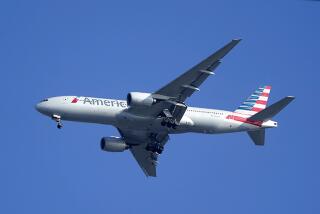U.S. Proposes Tough New Safety Rules for Commuter Airlines
- Share via
WASHINGTON — Commuter airlines would have to add safety equipment to their planes, give pilots more time off and improve operating methods under tough new rules announced Friday by the Transportation Department.
The rules, expected to take effect by the end of 1996, would bring the operators of planes with 10 to 30 seats under the same regulations that now cover the major airlines.
“Establishing a new standard of safety is essential to keeping pace with the tremendous growth of the commuter airline industry during the last two decades,” said Transportation Secretary Federico Pena.
The smaller airlines will be required to set up a system of certified dispatchers to coordinate flights, hire a full-time official responsible for safety, increase the test time for new airplanes, give maintenance workers more time off, add weather radar, emergency lighting and lavatory fire protection systems and install some additional cockpit equipment.
In addition, commuter pilots would be limited to flying 30 hours in seven days, 100 hours in a month or 1,000 hours in a year, the same as major carriers. Current commuter pilot standards are 34 hours in seven days, 120 hours a month or 1,200 hours a year.
Smaller planes were left some minor exceptions. For example, planes with under 20 seats would not have to have a flight attendant or a locking cockpit door.
Many smaller carriers, including those under contract to Delta, American and Northwest airlines, already are meeting the new standards, said David R. Hinson, the federal aviation administrator.
The new standards would cover 1,100 airplanes operated by 65 carriers. The rules are expected to cost $275 million over 10 years, but could prevent more than 90 accidents, Pena said.
The policy-oriented National Air Transportation Assn. complained about the cost and said the move was unnecessary because the smaller carriers are already very safe.
The Air Line Pilots Assn. and the Regional Airline Assn. both issued statements welcoming the change, however.
The rules are open for 90 days of public comment. Pena said he expected the final rules to be published in December, and that all airlines should be meeting the standards by the end of 1996.
More to Read
Inside the business of entertainment
The Wide Shot brings you news, analysis and insights on everything from streaming wars to production — and what it all means for the future.
You may occasionally receive promotional content from the Los Angeles Times.










